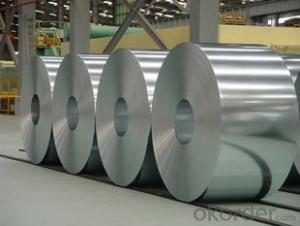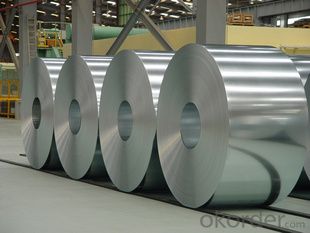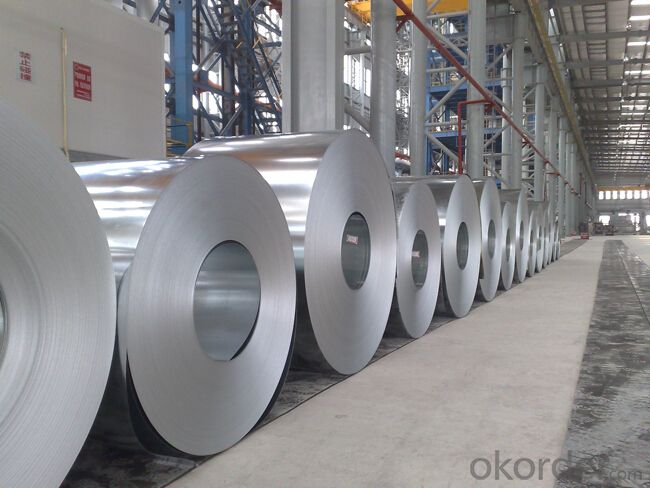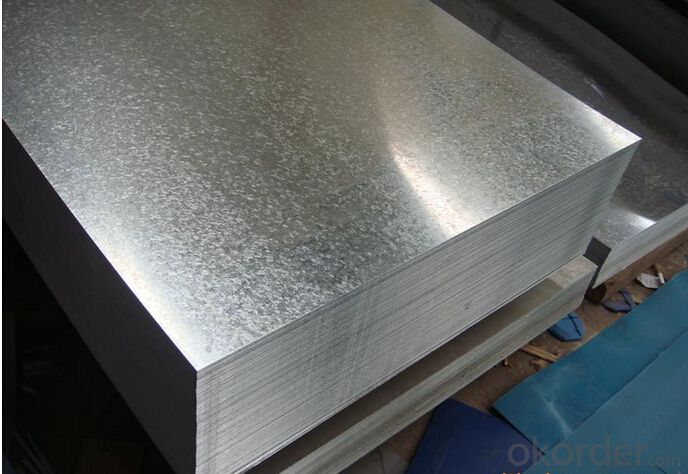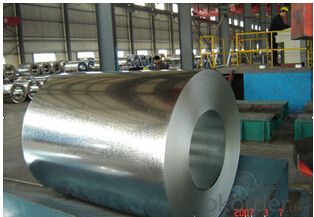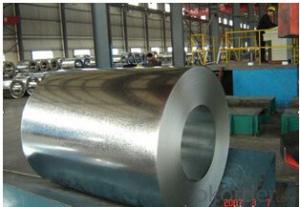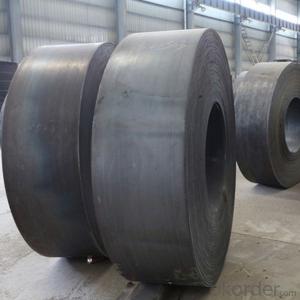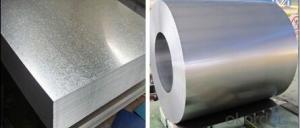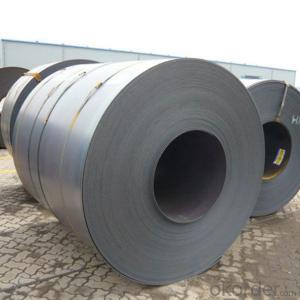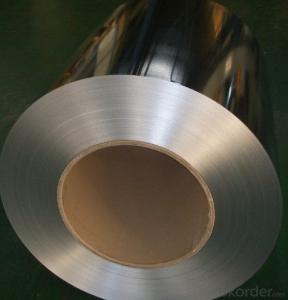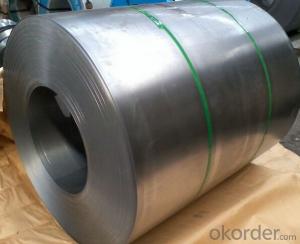High quality of galvanized steel coil from north of China
- Loading Port:
- Tianjin
- Payment Terms:
- TT OR LC
- Min Order Qty:
- 50 m.t.
- Supply Capability:
- 100000 m.t./month
OKorder Service Pledge
OKorder Financial Service
You Might Also Like
1. Hot-Dip Galvanized Steel Coil Description:
Hot-dip galvanized steel coil are available with a pure zinc coating through the hot-dip galvanizing process. It offers the economy, strength and formability of steel combined with the corrosion resistance of zinc. The hot-dip process is the process by which steel gets coated in layers of zinc to protect against rust. It is especially useful for countless outdoor and industrial application.
2.Main Features of the Hot-Dip Galvanized Steel Coil:
• Excellent process capability
• Smooth and flat surface
• Workability, durability
• Excellent heat resistance performance
• High strength
• Good formability
• Good visual effect
3.Hot-Dip Galvanized Steel Coil Images
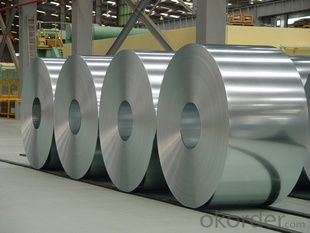
4.Hot-Dip Galvanized Steel Coil Specification
Standard: AISI, ASTM, BS, DIN, GB, JIS
Grade: SPCC, SPCD, Q195, DX51D
Thickness: 0.15-5.0mm
Model Number: coil
Type: Steel Coil
Technique: Cold Rolled
Surface Treatment: Galvanized
Application: Container Plate
Special Use: High-strength Steel Plate
Width: 600-1250mm
Length: depends
commodity: hot dipped galvanized steel coil
technique: cold rolled
thickness: 0.15-5.0mm
width: 600-1500mm
surface treatment: galvanized
zinc coating: 50-275g/m2
coil weight: 3-7 tons
coil ID: 508/610mm
spangle: zero spangle, regular spangle, small spangle, big spangle
payment term: by L/C or T/T
5.FAQ of Hot-Dip Galvanized Steel Coil
What’s the application of this product?
There are many applications for this product. For example, roofing, cladding, decking, tiles, sandwich walls, etc.
What’s the coating composition of Hot-Dip Galvanized Steel Coil?
The coating composition is 55% aluminium in weight ratio, 43.4% zinc, and 1.5% silicon, with excellent corrosion and heat resistance performance.
- Q: Ok I know this sounds stupid but is there anyway to make stainless steel look older? It looks too new and I don't want it like that. Thanks.
- Just abuse it. You could hit with a hammer, expose it to flame, throw it at or grind it around on rocks or concrete, rub it with steel wool. (be artful in how you do this, the pattern could end up looking too deliberate if you're not careful.) For an example of naturally aged stainless steel, look at some cooking pots/pans. If you don't have any old ones, maybe your parents or someone you know does. They usually get a little banged up/scuffed/stained after a while. (I think the stainless just means it doesn't rust.)
- Q: I'm currently in an Estimating and Bidding class. I have to estimate two divisions for a multi-million dollar project. The project that I chose is around 6 million dollars and involves constructing a new gas/lighting building. I chose to estimate steel, and my question is, around how much out of the 6 million goes toward just the steel estimate? If it helps, this building is has two floors and is roughly about 100x70 feet. The building not wood construction, but rather steel and brick. How much of that 6 million would go into the steel? I'm not looking for anything exact, just roughly.
- It is not clear what stage this project is in. Is it preliminary or has a detailed design been done. It is also not clear if this is only the steel material or does it include the labor as well. A rough guess using a percentage of the total cost is okay if you have historical data to help you. If you have a detailed design then the percentage method should only be used as a check on a detailed cost estimate developed from the plans. If you plan to use numbers provided by someone here on Answers I would hardly call that an estimate.
- Q: so i've started learning to play guitar in the past few weeks, and i'm using my sister's old guitar which isn't in very good condition, so i'm planning on buying a new one, but which would be better to buy, nylon string or steel string?
- it all depends nylon is faster, and brighter than steel, but is available only on acoustic as coil pickups won't detect them(only peizo will). That is one reason. Another is price, you tend to replace the nylon more often as it is weaker, and less resistant to corrision. EVEN THOUGH strings have a larger price range, and be cheaper than steel, or considerably more expensive. overall the nylon is brighter, but quite-er. Steel is louder, but deeper. nylon doesn't get feedback as easily, and is amazingly fast and easy to play. some think nylon sounds old fashoined(it looks it too, with an open headstock, ond classical look(sometimes mistaken as another name for it). MY SUGGESTION- visit your local music shop and try out steel, and nylons to in person get a feel for the sound.(remember that you get what you pay for, go as high in price as you can reasonably afford) ALWAYS TRY BEFORE YOU BUY, PLAY BOTH TYPES IN THE SAME RANGE OF PRICE(at least $400), THEN DECIDE WHAT SOUNDS BETTER TO YOU(and of course feels better and easier to play).
- Q: Is the product of mild steel environmentally friendly? does it produce any emissions?The same question for leather aswell.
- Steel just rusts, it doesn't produce any emissions just sitting there. They even make architectural steel called Corten to rust to a nice patina. If you consider how the steel was made in the first place, a great big NO! Steel making requires massive amounts of electricity plus it gives off some nasty fumes in the liquid state. Leather itself doesn't emit much of anything, but the dyes might. Again though, if you look at how it's made, tanning leather is right up there with steel mills and paper mills for pollution, some of the worst.
- Q: Steel is no doubt a better constructin material but it is only in practice in developed country.i would like that we should high lights the benifits and negatives of steel to make the steel more clear as a construction material.Hope some expert to address this topicMD
- Steel Structure considered as the most efficient and fast in completion of any project, specially the high rise buildings, also the logistics during construction is less complicated than the normal methods, Steel Structure has so many advantages vs the disadvantages, and highly recommended for commercial buildings
- Q: What are the environmental considerations of using steel coils?
- There are several environmental considerations associated with using steel coils. Firstly, the production of steel coils involves a significant amount of energy and resources. Steel production is a carbon-intensive process, contributing to greenhouse gas emissions, particularly from the use of fossil fuels in the manufacturing process. The extraction and processing of iron ore to produce steel coils also require extensive mining activities, which can lead to habitat destruction and soil erosion. Additionally, the transportation of steel coils can have environmental impacts. Steel coils are generally heavy and bulky, requiring large vehicles for transportation. This can result in increased carbon emissions and air pollution due to the use of fossil fuel-powered transportation methods. Furthermore, the disposal or recycling of steel coils can pose environmental challenges. If steel coils are not properly managed after use, they can end up in landfills or incinerators, contributing to waste generation and potential pollution. However, steel is a highly recyclable material, and by implementing effective recycling practices, the environmental impact of steel coil disposal can be minimized. Lastly, the use of steel coils in construction and manufacturing industries can have indirect environmental impacts. Steel coils are commonly used in the construction of buildings and infrastructure, which can result in deforestation and habitat loss due to land clearing. Moreover, the manufacturing processes that utilize steel coils may generate waste, pollutants, and emissions that can harm ecosystems and human health if not properly regulated and managed. To mitigate the environmental considerations associated with using steel coils, various measures can be taken. These include implementing energy-efficient technologies and practices in steel production, promoting sustainable mining practices, optimizing transportation logistics to reduce emissions, encouraging responsible disposal and recycling of steel coils, and promoting the use of alternative materials or steel products with a lower environmental footprint, such as recycled steel or steel with a higher proportion of recycled content.
- Q: What is the average turnaround time for processing steel coils?
- The average turnaround time for processing steel coils varies depending on several factors such as the size, complexity, and specific requirements of the coils. However, it typically ranges from a few days to a couple of weeks.
- Q: Can steel coils be coated with nickel?
- Yes, steel coils can be coated with nickel.
- Q: I have hundreds of pounds of scrap steel... who purchases this steel and what is the price per pound etc. of this? Does someone pick it up or do I bring it somewhere?
- Right now, steel is worth $150/ton. Who purchase it? Well, not every scrap yard handle steel, you have to call them up, or look at the company name that has the word steel or iron. But price can vary from each scrap yard. Try to call around. As for someone to pick it up, the scrap yard will mostly charge you a trucking fee and then the price for steel would be lower. But here is another bad thing if you have it pick up. I know some scrap yard are bad...reall bad..they will skim off some weight...a 1k lbs to 2k lbs. Wish you good luck!
- Q: I work at a tool store. I told my boss last week we needed more pruning shears so he did get more of all kinds. Thing is out of all of the shears he brought Two of different kinds say they are made out of Japanese steel. I have never heard of Japanese steel so now i ask you (the public) whats the difference between it and steel from the US or any other country? Those shears are worth more then the ones he gets from Mexico and China and even more than Black and Decker, Fiskars, etc but not more then Corona brand ones.
- Well Japan, with democracy and code standards, would be better than China or Mexico, with poorly paid workers and poor standards and poor quality. I don't know why or if its better quality than US steel
Send your message to us
High quality of galvanized steel coil from north of China
- Loading Port:
- Tianjin
- Payment Terms:
- TT OR LC
- Min Order Qty:
- 50 m.t.
- Supply Capability:
- 100000 m.t./month
OKorder Service Pledge
OKorder Financial Service
Similar products
Hot products
Hot Searches
Related keywords
